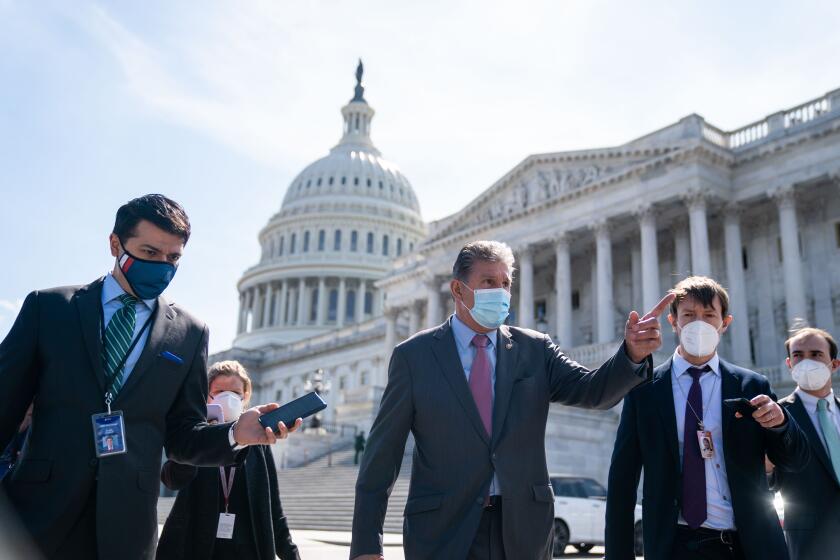Go narrow and deep. The three things the U.S. must accomplish in 2022

- Share via
Time for resolutions, right? The long list of the goals we make for ourselves in the new year often fall by the wayside without much progress. That also tends to be how we operate at the political and societal level: trying to fix too much at once, at best making incremental progress, but not enough to bring about real change.
Instead of listing copious resolutions for 2022, it makes more sense to set priorities. In that spirit, we have three suggestions for how the United States should prioritize its efforts next year. If our nation cannot make serious progress on these top issues, we won’t have much of a future for taking care of all the other matters that cry for attention.
Go big on climate change
Our nation — and to be fair, most nations — has waffled on climate change or introduced only minor changes. We’re told that it would be too expensive to make massive switches to solar and wind power, too inconvenient to drive all-electric vehicles or to ban natural-gas hookups in new construction. President Biden’s proposal to invest heavily in fighting climate change is in serious peril.
Editorial: Climate change is ravaging the planet. Don’t let Joe Manchin slow the U.S. response
President Biden’s “Build Back Better” bill included $555 billion to help wean America off fossil fuels. Congress must resurrect the plan.
Torrential rainfall in other areas of the country is becoming more common, according to the most recent National Climate Assessment. Rising sea levels threaten populations in low-lying coastal areas across the world — it’s already felt in Africa, according to a Nigerian climate report — and large-scale resettlement of those people would almost certainly lead to widespread famine and political destabilization.
There is still an opportunity to evade the worst climate change effects and bring global warming back to within tolerable levels — if we move quickly and decisively.
Countries that have pledged to reduce their emissions under the 2015 Paris accord must stop dawdling and take swift and decisive action. The onus is particularly on the U.S., which is responsible for releasing more carbon emissions over time than any other country.
The most expedient first step is for Congress to pass President Biden’s “Build Back Better” bill. It contains $555 billion to incentivize renewable energy and clean transportation, and would be the country’s largest-ever action against climate change. This is a once-in-a-generation opportunity to enshrine climate action into federal law, and if it fails it would almost certainly doom Biden’s goal of cutting the nation’s greenhouse gas emissions 50% from 2005 levels by 2030, a trajectory that is necessary to keep climate change from reaching truly catastrophic levels.
This legislation should be only the beginning of a raft of new federal and state policies to quickly reduce fossil fuel consumption by deploying more renewables such as solar and wind to clean up the electrical grid, phasing out gas-fueled cars in favor of zero-emission models, and electrifying buildings to get rid of their use of fossil gas for heating and cooking.
Dozens of national governments and major automakers including GM and Ford signed a pledge during the U.N. climate summit in November to “work toward” making all new car sales zero-emission by 2040, but the U.S. shamefully decided not to sign on, even though the transportation system remains the biggest single source of planet-warming emissions.
The U.S. also must follow the lead of countries like Costa Rica and Denmark and make firm commitments to ending oil and gas production by specific dates that are supported by climate science. Fossil fuel production cannot continue if we are to have a habitable planet.
Save democracy
The shocking insurrection at the U.S. Capitol a year ago brought home the fragility of our democratic institutions. But that horrifying event was only the most dramatic example of what has been a continual attack on our democracy over the last several years.
From Republicans trying to rig elections with gerrymandered political districts, eroding voting rights and encouraging illegal attempts to thwart election results that don’t please them to former President Trump’s outrageous authoritarian impulses, the very foundations of this nation and its Constitution have been breached.
We cannot progress as a nation or address such issues as healthcare and efforts to fight COVID-19 unless all Americans are able to speak out effectively at the ballot box.
These are some of the actions Congress must take in 2021:
• Pass the Protect Our Democracy Act, which the House has approved twice, but not the Senate. It would provide clear and enforceable laws against a wide range of executive branch abuses, such as not allowing the president to pardon himself. Otherwise, the president and his supporters can assert that anything the president does is by definition not a crime. In fact, Trump’s legal team said exactly this during the first impeachment.
The act also would place clear limits on the president’s power to pardon others, which now can be used to bail out those in the president’s favor. It would protect inspectors general, the people hired to keep government and elected leaders honest, from being fired, demoted or otherwise disempowered without good cause — something Trump did several times. And it would prohibit presidential self-dealing, using the office to enrich oneself or one’s associates.
• Pass the John Lewis Voting Rights Advancement Act, which would restore and strengthen parts of the Voting Rights Act of 1965 after the U.S. Supreme Court struck down portions of it in 2013. The legislation would keep states from restricting the right to vote, as many have with rules that, for example, make it more difficult to vote by mail or require extra voter identification. Those rules chill voting by Black and Latino, low-income, young and elderly citizens.
• Introduce and pass federal legislation that requires the secretaries of state in individual states to certify election results in the absence of clear evidence of fraud. This is what Georgia Secretary of State Brad Raffensperger did after the 2020 presidential election, standing up to outrageous pressure from Trump to subvert a properly held election. But we cannot count on every secretary of state to be as ethical as Raffensperger.
Vanquish COVID-19 and protect science
Though we continue to struggle against new variants of the coronavirus, scientists made extraordinary progress in developing effective vaccines that protect against COVID-19 as well as in understanding how the virus acts. New treatments for those seriously ill with COVID-19 offer real promise as well.
Our worst enemy in fighting COVID-19 is the stubborn resistance among segments of our society to science and a lack of understanding of how it works. This started long before the pandemic; we saw it in climate change denial for decades. Despite the clear evidence, there are still far too many people who refuse to accept the science on human-caused global warming.
That often outright rejection of science has fueled vaccine resistance in recent years, deepened during the pandemic as people were asked — or required — to mask up or be immunized against the virus. This is not a situation where society can say, “OK, it’s your life. Go unprotected if you want.” Lack of vaccination threatens public health as a whole; masks largely protect not the wearer, but the people around the wearer. Lack of belief in evidence-based facts has contributed mightily to the dangerous divisiveness in the country.
As we continue to try to vanquish COVID-19, we also must engage in serious public education on science. This, of course, starts with schools, where courses need to do more to help students comprehend how laboratory science works. When the president touts a treatment for which there’s no evidence of effectiveness — as Trump did with hydroxychloroquine — students need the skills to understand how dangerous it is to push relentlessly for a treatment based on one substandard study.
Let’s face the uncomfortable reality of what has to get done in 2022, so that in future years we can start working on the rest.
More to Read
A cure for the common opinion
Get thought-provoking perspectives with our weekly newsletter.
You may occasionally receive promotional content from the Los Angeles Times.










